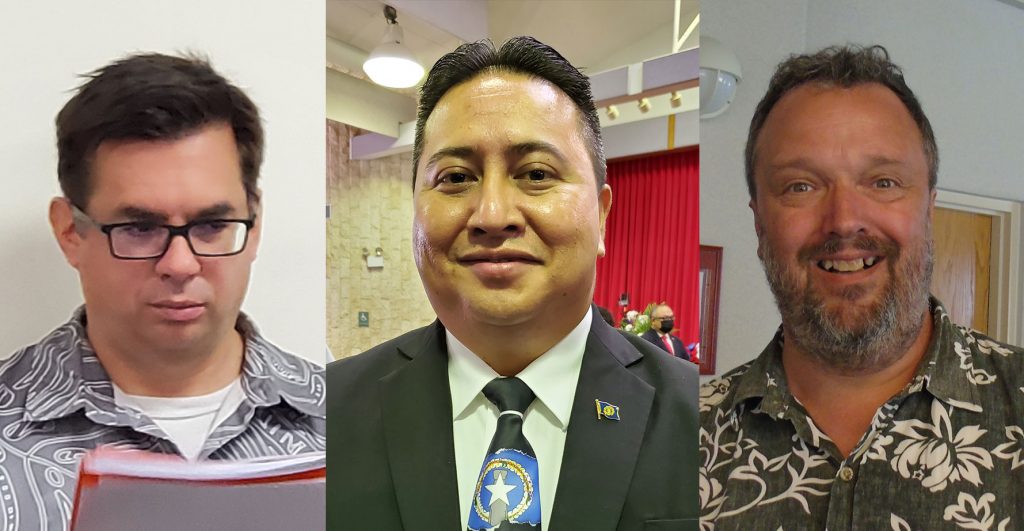Torres sues to quash subpoena
The unconcealed animosity between Gov. Ralph DLG Torres and the House of Representatives Judiciary and Governmental Operations Committee spilled into the court yesterday, after Torres snubbed the JGO subpoena that commanded him to appear before the committee yesterday, provoking the committee to hold him in contempt and prompting Torres to ask the court to quash the subpoena.
Torres and the Office of the Governor filed yesterday afternoon a lawsuit against the JGO Committee over its decision to hold him in contempt. Torres and the Office of the Governor, through counsels Joseph E. Horey and Gilbert Birnbrich respectively, asked the Superior Court to declare that the JGO Committee’s subpoena served on the governor is invalid and unlawful.
Torres and the Office of the Governor asked the court to quash the subpoena and stop the committee from enforcing the subpoena and House sergeant-at-arms Pedro Towai from arresting the governor.
Towai was named as co-defendant in the complaint in his capacity as House sergeant-at-arms.
The plaintiffs demanded payment of costs incurred in filing the lawsuit.
The plaintiffs are suing the JGO committee for violation of Commonwealth statute in issuing the subpoena, infringement upon the testimonial immunity conferred by the Commonwealth Constitution, lacking valid legislative purpose in violation of the Commonwealth Constitution, and usurping responsibilities constitutionally delegated to other executive offices in violation of the Commonwealth Constitution.
According to Horey and Birnbrich in the complaint, last Dec. 4, Torres was served with a subpoena issued by JGO Committee chair Rep. Celina R. Babauta (D-Saipan), in which the committee purported to “command” Torres to appear at a particular time before the committee to testify on a wide range of subjects, some of which may implicate executive privilege.
They said the subpoena threatens that, unless Torres accedes to the subpoena, he may be “subject to contempt.”
They said Torres regarded the subpoena as unlawful and unconstitutional.
Horey and Birnbrich said the governor earlier communicated with the committee in repeated attempts to find common ground or a compromise solution, but the committee rejected any proposal.
They said Torres therefore did not appear before the committee last Friday at 10:30am.
As a consequence of his non-appearance as “commanded,” the committee voted yesterday morning to hold the governor in contempt.
They said the JGO committee is not an “investigating committee,” but a regular standing committee of the House and has not been “authorized” by either full House of the Legislature to issue subpoenas.
The lawyers said the subpoena was not issued in any “matter pending before” the committee, since it relates to no matter referred to the committee by the House, which are the only measures of which the committee may properly and lawfully take cognizance. They said the subpoena was therefore issued in violation of Commonwealth law.
Horey and Birnbrich said it violates the principle of separation of powers for one branch to “command” another branch to take any action whatsoever. In particular, they said, it violates the CNMI Constitution and the Covenant for a committee of one chamber of the Legislature to command the live testimony of the governor, particularly at a time and place and for the length of its choosing, and especially on subjects that would implicate information protected by executive privilege.
“Such an action interferes with the function of the Executive Branch,” the lawyers pointed out.
They said the subpoena threatens the governor with imprisonment should he not comply fully with it. They said the arrest or imprisonment of the governor for defying a “command” of a committee of a house of the Legislative Branch would also unduly interfere with the functioning of the Executive Branch of government.
For these reasons, they said, Torres has immunity from the subpoena, and its enforcement against him would violate the principle of separation of powers, and thus violate the CNMI Constitution.
They noted that there is no pending legislation related to the issues identified in the subpoena, nor do they concern any subject on which legislation could be had.
“Nor are any impeachment proceedings pending,” Horey and Birnbrich said.
They said the legislative branch may not issue a subpoena for the purpose of law enforcement, because those powers are assigned under the CNMI Constitution to the Executive and the Judiciary, yet the subpoena is manifestly for the purpose of law enforcement.
The lawyers said the subpoena was therefore not issued in furtherance of a valid legislative purpose, and is unconstitutional and void.
Horey and Birnbrich said that, by issuing the subpoena pursuant to investigations that are constitutionally assigned to the Attorney General and the Public Auditor, the JGO Committee has usurped their constitutional functions, and breached the CNMI Constitution. This makes the subpoena unconstitutional and invalid, they said.
























